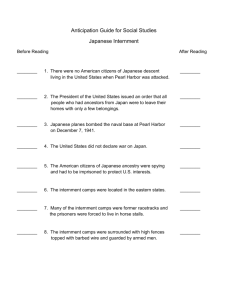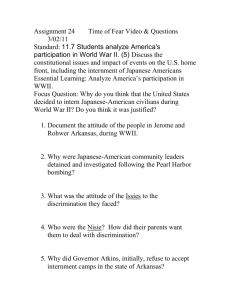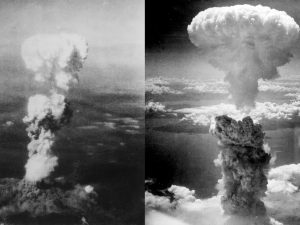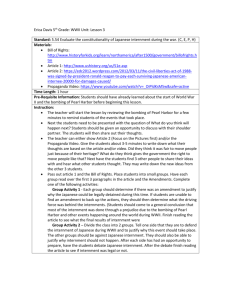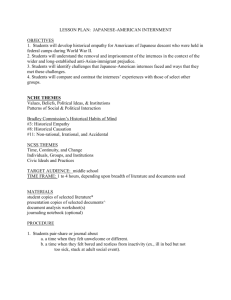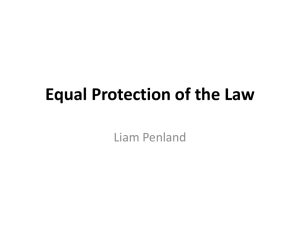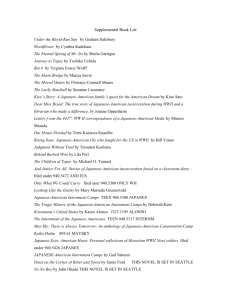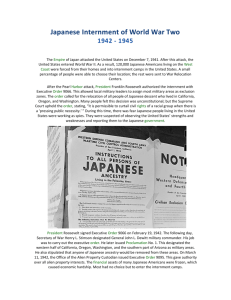PowerPoint: Japanese-American Internment
advertisement
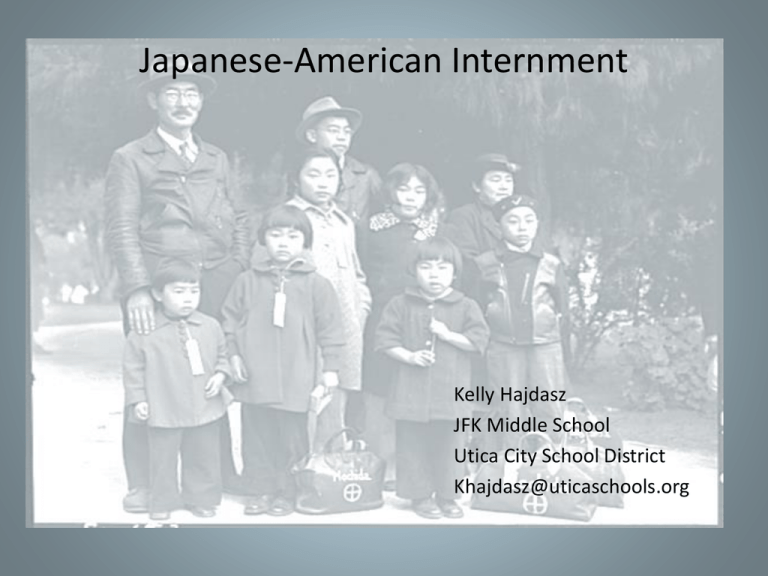
Japanese-American Internment Kelly Hajdasz JFK Middle School Utica City School District Khajdasz@uticaschools.org Japanese-American Internment After the attack on Pearl Harbor, many Americans questioned the loyalty of Japanese Americans, fearing they may act as spies or help Japan invade the U.S. The Wartime Relocation Agency (WRA) forced approximately 120,000 Japanese Americans to relocate to inland camps, living in crowded barracks behind barbed wire. Identify the Problem Who was involved? What happened? Where did it happen? When did it happen? Why did it happen? How did it happen? Korematsu v. U.S. Japanese American Internment (U.S. Govt Film) Korematsu Information This Is the Enemy Prisoner of My Country Kenji Gather Evidence Why was Japanese-American Internment necessary? • • • Why was Japanese-American Internment unnecessary? • • • December 7, 1941 CASUALTIES 2,408 KILLED - 1,178 WOUNDED = 3,586 TOTAL NOTE: Many more were known to have received wounds from shrapnel and other flying debris that didn't receive hospitalization in the already overcrowded medical facilities and no records were kept of their treatment. Executive Order 9066 Determine the Causes Attack on Pearl Harbor Anti-Japanese Sentiment Executive Order 9066 For each of the above events, answer the following questions: Who was involved? What happened? Where did it happen? When did it happen? Why did it happen? How did it happen? Evaluate the Policy Use the link to evaluate the American relocation policy. Was the government justified in placing JapaneseAmericans in internment camps? Yes No 1. 2. 3. 1. 2. 3. Explain your position on whether or not the government was justified in placing Japanese-Americans in internment camps. Resources Pearl Harbor: The Attack. Photographs. http://www.pearlharborsurvivorsonline.org/. April 30, 2013 Anti-Japanese propaganda posters. Propaganda posters.puredanceensemble.com, http://www.kidport.com/Reflib/WorldHistory/WorldWarII/WorldWarIIPacificEvents.htm, http://fortmissoulamuseum.org/WWII/detail.php?id=431 . May 1, 2013 Korematsu v. United States. Cartoon. http://www.streetlaw.org/en/landmark/cases/ korematsu_v_united_states. May 2, 2013 Japanese family. Picture. http: //www.nationalww2museum.org/learn/education/forstudents/ww2-history/ww2-by-the-numbers/japanese-american-internment.html.May 5, 2013 Japanese-American Internment. Pictures. http://elliottworldwar2.wikispaces.com/ Japanese-American+internment+camps ,http://mvmsreader.pbworks.com/w/page/ 7927229/Farewell%20To%20Manzanar%20B%20Block, http://www.nww2m.com/ 2012/02/executive-order-9066-70th-anniversary-japanese-internment-februrary-19/wdcjapanese-internment-announcement/, http://www.fasttrackteaching.com/burns/ Unit_10_WW2/U10_race_issues.html . May1, 2013 Media Sources This is the Enemy. Video.http://www.youtube.com/watch?feature=player _detailpage&list=PL64CF32E398486D3C&v=JkaQqzumMGE.May 2, 2013 Manzanar. Music Video. http://www.youtube.com/watch?v=Xon4mjDXB8&playnext =1&list=PLC6E7984A80F52585 . May 6, 2013 Japanese Relocation. Gov’t propaganda film. http://www.youtube.com/watch?v= _OiPldKsM5w. May 1, 2013 Pearl Harbor attack scene. Movie. http://www.youtube.com/watch?v=WHU5l788bgs. May 2, 2013 Declaration of War. Speech to Congress.http://www.youtube.com/watch?v =lK8gYGg0dkE. May 2, 2013 Executive Order 9066. Letter. http://www.archives.gov/historical-docs/todaysdoc/?dod-date=219. May 2, 2013 Uchida, Yoshiko. (1995). Prisoner of My Country. The Invisible Thread: p.72-79. New York, NY: Beech Tree Books
